Web Hosting Basics For Beginners (+ Top 7 Hosts To Try In 2023)
When looking at web hosting options, you’ll see many offering the same perks: “Free domain names and SSL certificates!” “Unlimited disk space and bandwidth!”
Are these the best criteria by which you pick a host? Well, these things may be important, but there are other factors to consider, including:
- Your resource and performance requirements
- The host’s ease of use and plan customizability
- Customer service quality
- Infrastructure reliability and uptime, including money-back guarantees
- Your hosting plan’s scalability and flexibility
- Data security, including backup and restoration services
In the following sections, we’ll take a look at why these factors matter and which ones you may wish to prioritize.
Contents
- 1 The 7 Best Web Hosts of 2023
- 2 Types of Hosting
- 3 How to Choose the Best Web Host for Your Needs
- 4 Summary – What Makes Some Web Hosts the Best?
The 7 Best Web Hosts of 2023
Based on our monitoring of uptime and performance, as well as reviews from users, we’ve identified the following as the best web hosts of 2023.
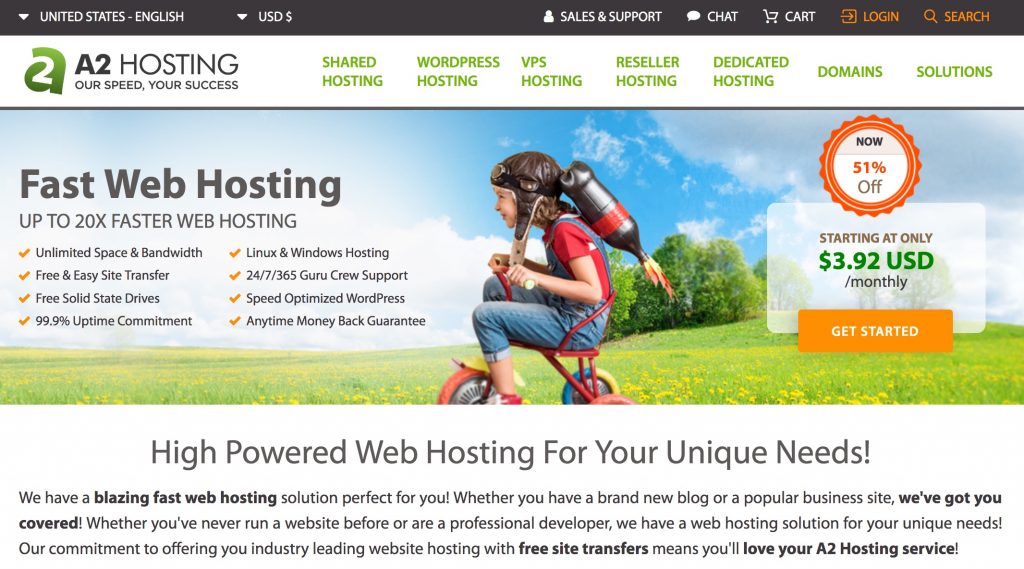
A2 Hosting
A2 Hosting is a developer-friendly web hosting company that supports many technologies and languages.
We found A2 Hosting to offer one of the best uptimes, although the response times were on the poor side. In user reviews, customers speak highly of the company’s support team.
On the other hand, A2 Hosting isn’t the cheapest option, it doesn’t offer free domain names, and might not be the easiest for newbies to use.
Pros
- Supports many technologies and frameworks
- Excellent uptime
- Free automatic daily backups
- Free SSL certificate
- Free website migrations
Cons
- Can be challenging to someone new to web hosting technologies
- Expensive renewal prices
[ Ready to try A2 Hosting? Get our discount. ]

Bluehost
Bluehost is officially recommended by WordPress.org and the company’s beginner-friendly hosting options will appeal to many.
The name of the game at Bluehost is simplicity. The company’s plans are full-featured throughout and come with a custom control panel designed to make website management easy.
Bluehost is faster than A2 Hosting. It will throttle your resource usage if you use too much of the “unlimited” offering, and their support isn’t typically considered best-in-class.
Pros
- Many plans to choose from
- Great value for your money
- Includes a CDN and an SSL certificate
Cons
- Backups aren’t guaranteed
- A learning curve with the custom control panel
[ Decided to try Bluehost? Get our discount. ]
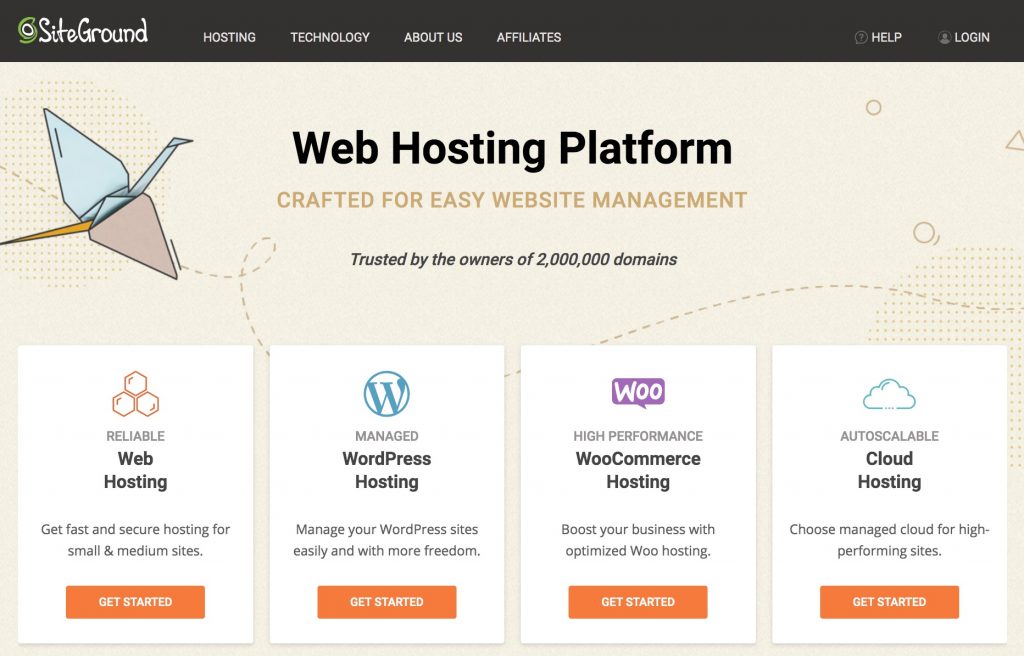
SiteGround
If you want budget-friendly, full-featured hosting plans that come with industry-leading support, look no further than SiteGround.
The company offers a variety of web hosting options that you can grow into overtime. They’re known for their WordPress expertise and proprietary security technology powered by artificial intelligence.
The downsides, however, include slightly higher monthly fees.
In our testing, SiteGround’s average server response times are higher than A2 Hosting’s and lower than Bluehost’s or GreenGeeks’.
Pros
- Lots of scalable hosting options
- Fast and stable servers
- Reliable 24/7 cross-platform support
Cons
- Pricy for newcomers with low requirements
- No site transfer on the base plan
- No free domain name
[ Want to try SiteGround? Use our discount. ]
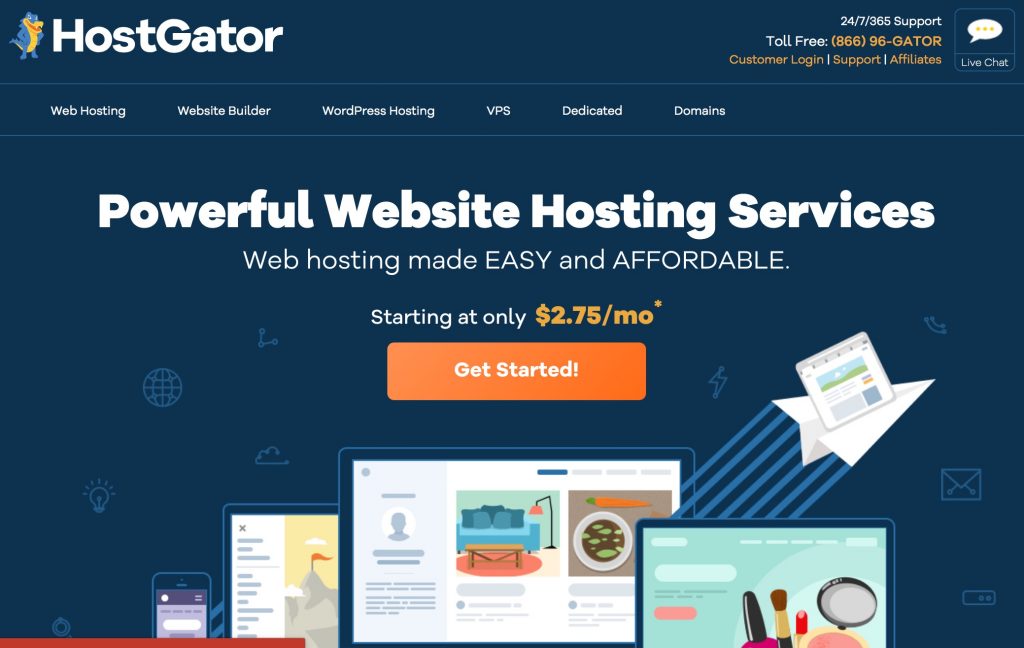
HostGator
HostGator describes its web hosting options as “easy and affordable.” Their plans come with unlimited resource allocations, a 99.9% uptime guarantee, and a generous 45-day money-back guarantee.
Though the company’s offerings aren’t as robust as some of its competitors, HostGator does offer a variety of options that will appeal to many types of customers – beginners and business owners alike.
On the flip side, extras like SiteLock security, downgrades, account restorations, and dedicated IPS (to name a few) cost extra, and the response times are almost half of SiteGround’s.
Pros
- 45-day money-back guarantee
- Free Weebly website builder
- Search engine credits included with plans
Cons
- No optimized WordPress hosting
- Not HIPAA-compliant
- Fee for restoring backups
[ Think HostGator’s right for you? Be sure to get our discount. ]
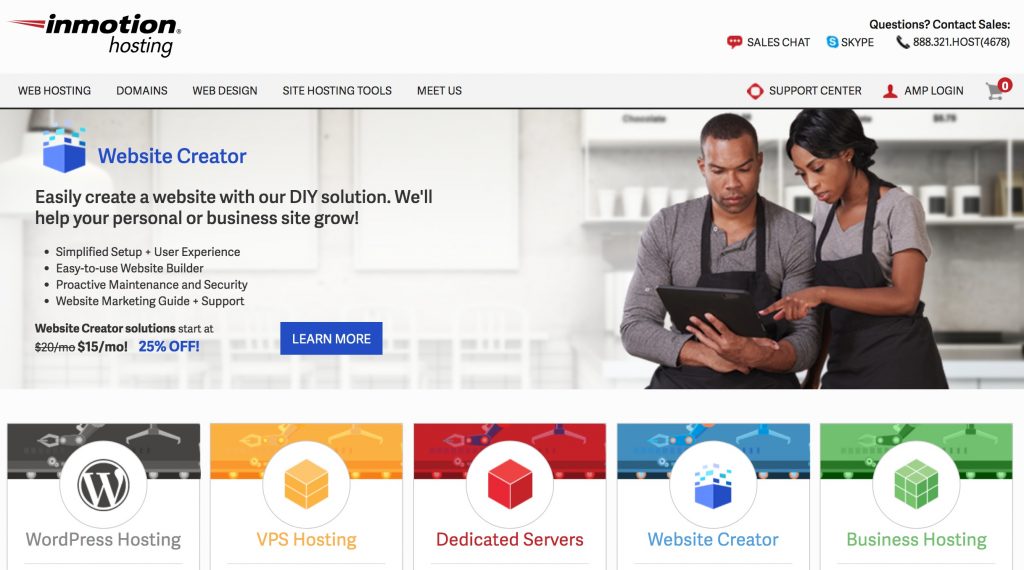
InMotion Hosting
InMotion is a one-stop-shop for most services website-related, including hosting, domain names, and web design. They even offer design services, an unusual offering, since many hosts only offer DIY tools like website builders.
InMotion is also committed to open source products and offers solid customer service.
The downsides of InMotion, however, include higher price points and lower resource allocations. We also noticed that InMotion is significantly slower than its competitors, with response times exceeding 1,379.5 milliseconds.
Pros
- 90-day money-back guarantee
- Green servers & fast technology
- Outstanding support & documentation
Cons
- Datacenters located in North America only
- Priority support comes only with top-tier plans
[ Ready to try InMotion Hosting? Get our discount. ]

Squarespace
If you want access to some of the best-looking themes around, an easy-to-use editing interface, in an all-in-one package, Squarespace is the option for you.
You’ll also get robust reference materials and good customer service.
The downside, however, is that Squarespace doesn’t offer complete customization of your site, and it’s on the expensive side.
Those with large online stores will likely find the functionality restrictive.
Pros
- Beautiful, easy-to-use website builder
- Fully managed server-side
- Excellent support and training materials
- Free 14-day trial
Cons
- Pricier than many other hosts, but comes with site builder.
- Phone support not offered
[ Decided on Squarespace? Use our discount. ]
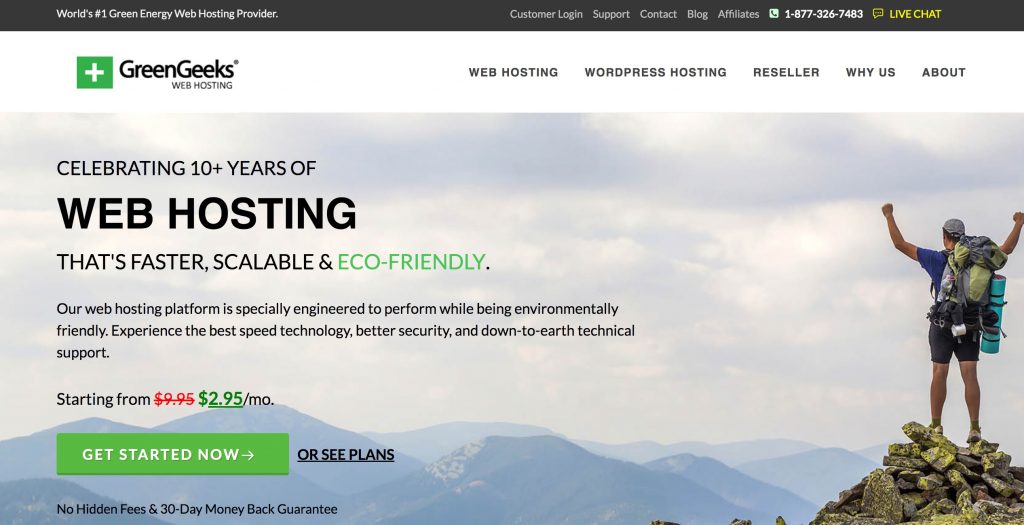
GreenGeeks
GreenGeeks‘ unique value proposition is that it is a “green” web host that doesn’t skimp on performance or technology. Their day-to-day operations are fully carbon neutral.
The company states that there are no hidden fees. Customers speak highly of GreenGeeks’ customer service. Average server response times are fastest out of all competitors, and uptimes are impressive too.
However, large enterprises would do well to look elsewhere, since the company doesn’t offer advanced options.
Even if you’re content with shared hosting, you might find GreenGeeks’ plans limited, even at the fairly expensive, top-tier option.
Pros
- Eco-friendly – replaces 300% of the energy it consumes
- Free site migration and nightly backups
- Free website builder
Cons
- 3-year commitment for lowest prices
- Linux servers only, no Windows servers
[ Want to try GreenGeeks? Use our coupon. ]
Types of Hosting
Before you can choose the best web hosting company for you, you’ll need to determine the type of hosting that fits your needs.
Typically you’ll be deciding between shared hosting, VPS hosting, dedicated servers, cloud hosting, and WordPress hosting.
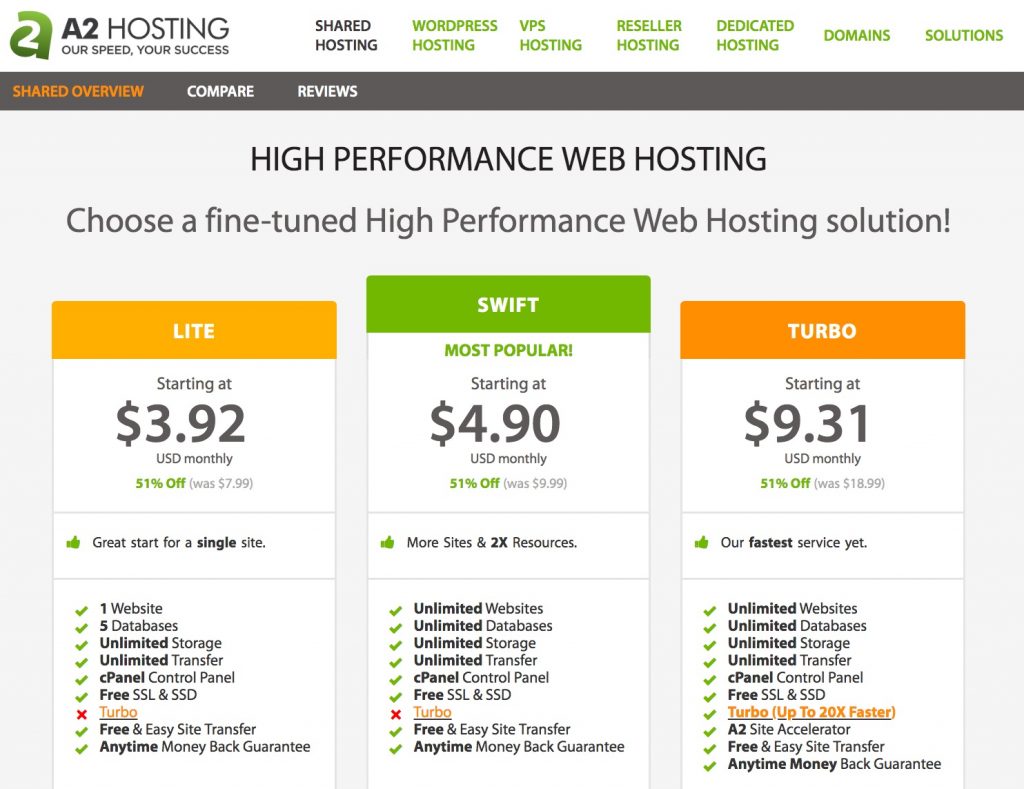
Shared hosting is the cheapest option available, with many websites sharing the resources available on a single server.
The trade-offs for low prices are smaller resource allocations. And, if you’re on an “unlimited” plan, your host might throttle your traffic if you use too much. You might also experience slower speeds and possibly, a higher risk of downtime.
Make no mistake though: many websites are more than adequately served with a shared hosting plan.
WordPress users seeking shared hosting would do well with Bluehost or SiteGround, while those who are more technically oriented would be happy with A2 Hosting.
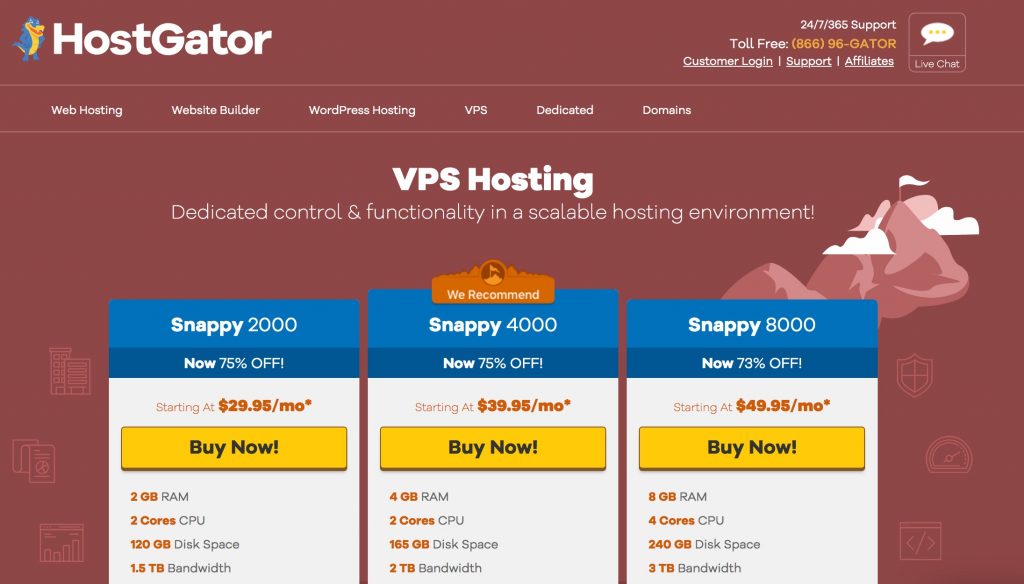
VPS Hosting
VPS hosting is a more advanced option where a web host divides a server up using virtualization tools.
VPS hosting is similar to shared hosting in that multiple sites share a physical server, but the virtualization software maintains hard boundaries between the resources devoted to one site and resources devoted to others.
VPS hosting is faster than shared hosting and potentially offers better uptime.
However, VPS hosting is also more expensive than shared hosting. Unless your website gets high-traffic or you have a resource-intensive website, a VPS plan probably won’t be necessary.
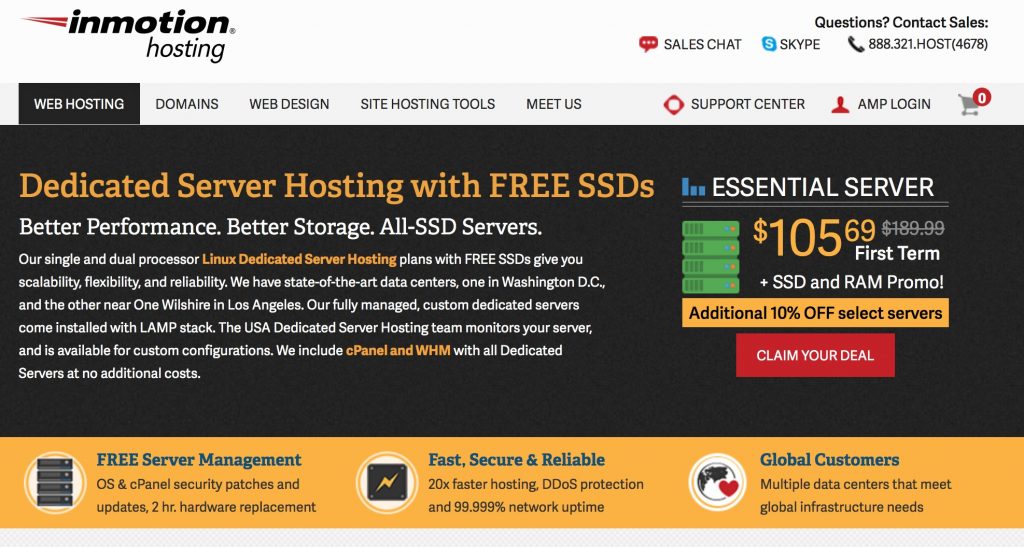
Dedicated Server
A dedicated server is a physical server dedicated to your website alone. Everything installed can be used by your site only, and you have full control over the software that is installed onto your server.
Prices for a dedicated server vary, with some options costing not much more than a VPS plan, while others cost hundreds (or even thousands) of dollars per month.
Because dedicated servers are expensive, and because they require a lot of technical competence to set up, configure, and maintain, we don’t recommend one for any but the biggest, busiest websites.
If system administration isn’t your cup of tea, you can opt for managed services where the web host handles most of these tasks on your behalf, but at a higher cost.
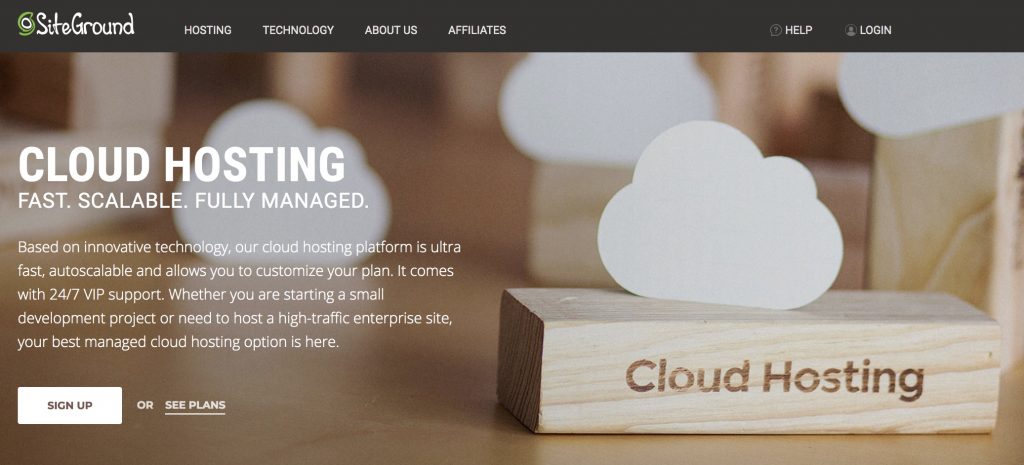
Cloud Hosting
Cloud hosting is where your website isn’t hosted by a single server, but a cluster of servers working together as if they were a single server.
This configuration offers you a more robust hosting environment since a single server going offline for whatever reason will likely not affect your website.
Depending on how your web host is set up, your cloud-based data may be distributed in multiple locations around the world.
Cloud hosting is a viable alternative to dedicated hosting since the former offers easily scalable options that can meet increased loads as needed.
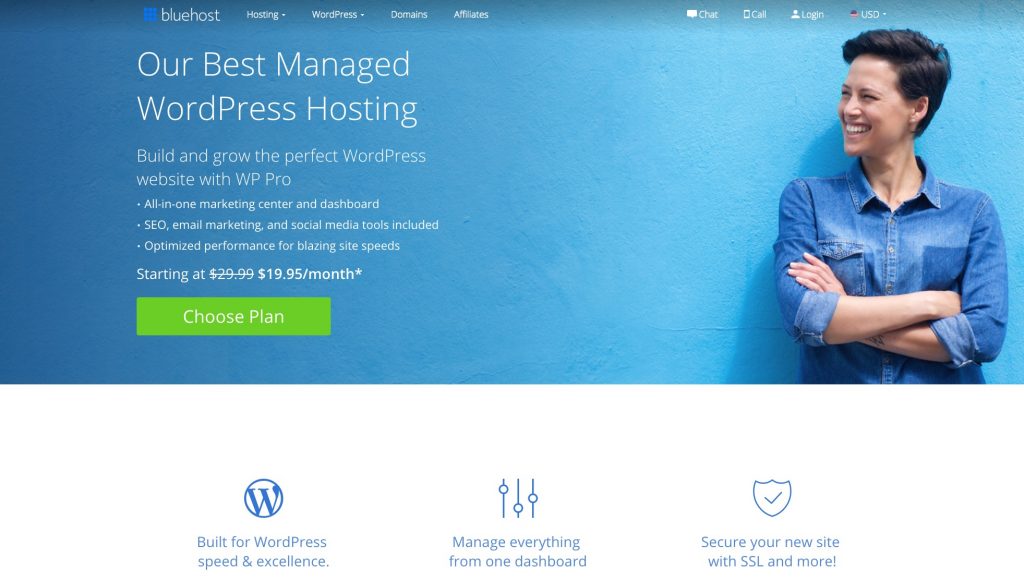
WordPress Hosting
WordPress is a user-friendly content management system (CMS) that allows people to get up and running with a blog or website, even if they’re new to the world of web design and development.
Because WordPress is so commonly used, many hosts offer specialized WordPress plans that include features catering to this demographic, including automatic updates to the WordPress core, free themes and plugins, and so on.
Automattic, the parent company behind WordPress, recommends Bluehost as a good option for WordPress users.
How to Choose the Best Web Host for Your Needs
Now that we’ve briefly covered the best web hosts today and types of web hosting available, let’s take a look at the specific features and functionality you’ll want to look for when making your purchase.
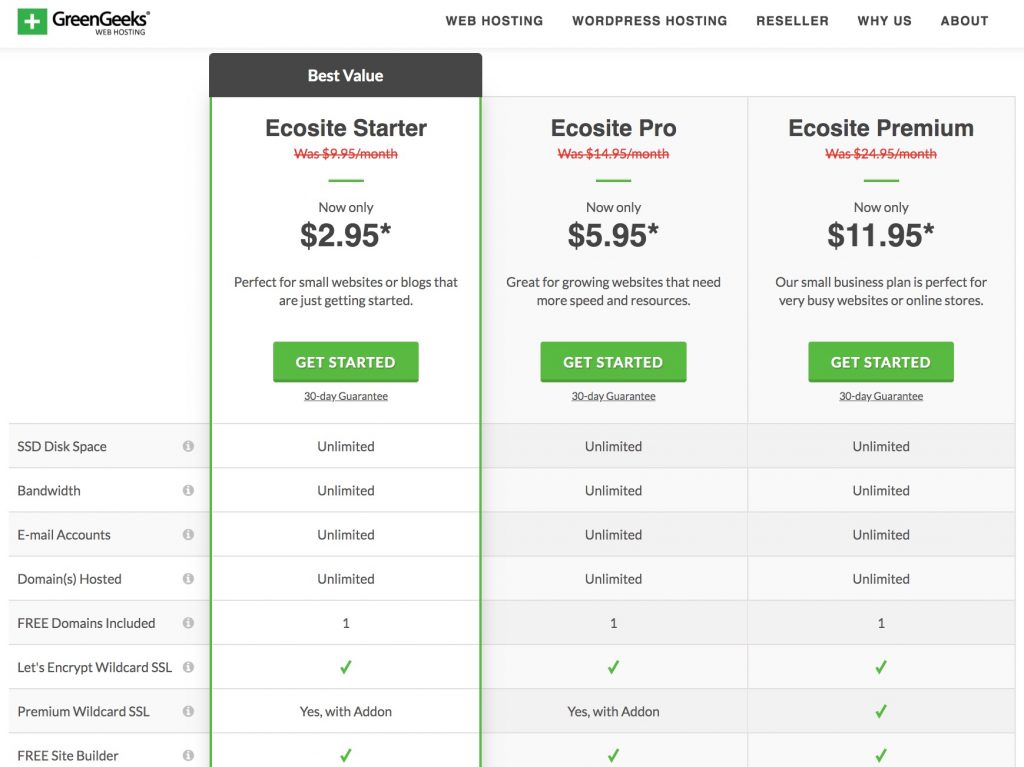
Resource and Performance Requirements
Speed matters and this is measured in how long it takes a server to respond to a request. The top hosts have response speeds in the range of 250 – 450 milliseconds or so.
Many hosts will offer unlimited bandwidth — a measurement of the traffic that goes to and from the server on your behalf — and unlimited storage with their shared hosting plans.
However, before you purchase, read the fine print. A lot of hosts will throttle your site if you use too many resources so that you don’t negatively impact the performance of other websites that share your server.

Is It User-Friendly? Customizable?
Many web hosting plans come with a website builder that will help you get up and running with a website, even if you’ve never written a line of code before.
Squarespace is a leader in offering easy-to-use website building tools, but if you are interested in coding your own site, HTML.com can help you get started.
If you need more features, including support for an e-commerce site, consider Squarespace’s premium offering.
You can also consider a more premium hosting plan from sites like SiteGround or A2 Hosting. The biggest downside is that you’ll have to decide on and bring your own e-commerce platform to implement the functionality you need.
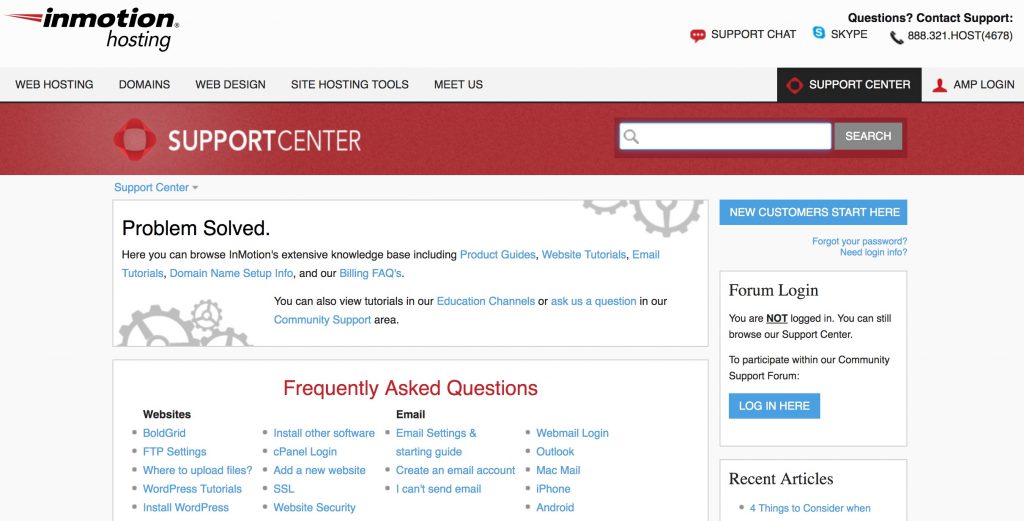
Quality of Customer Support
Many hosts offer 24/7 support reachable via email, telephone, live chat, and/or ticketing center.
Live chat and ticketing predominate in the world of technology because they’re highly efficient means of resolving issues. You can share links (and often screengrabs) via live chat so that the representative can see the issue you’re experiencing.
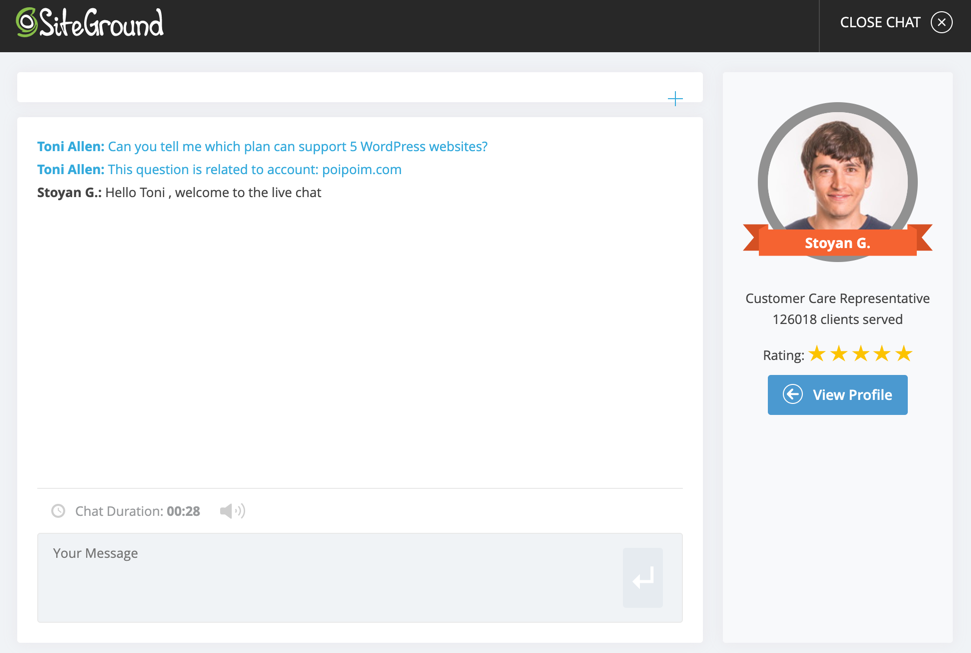
Tech Support When You Need It
Although you might not think you’ll need support at 3 AM, if the hosting for your online store goes down the night before Cyber Monday, you’ll be thankful someone at your hosting company is there to help.
The scope of support varies, but you can typically expect them to help you with things like setup, domain name setup, account management, and other basics related to setting up shop.
Support Team: In-House or Outsourced?
Another factor to consider is whether the support team is in-house. Some businesses (and individuals) prefer an in-house team.
In an era when companies sometimes cut customer support costs (and quality), it pays to find out exactly what kind of support you’ll be getting.
That said we’ve been impressed with the quality of some outsourced live chat support services.
Reliability: Infrastructure, Uptime and Money-Back Guarantee
The point of web hosting is to make sure that your website is available to users whenever they want to see it. Uptime is crucial.
What Is Uptime?
In web hosting, uptime refers to a website being online as opposed to offline. Reasons a site may go offline include routine maintenance performed by the host, natural disasters or severe weather events, and cyber attacks.
A web host’s infrastructure and datacenter are key to making sure that this number is as high as possible.
Uptime is an average, measured as a percentage, spanning a set time interval, such as a month.
For example, if your website had a 99.9% uptime rate for April 2019, that means it was offline for about 24 minutes during that month.
Uptime Guarantees
Many hosts offer an uptime guarantee.
This is often spelled out in an “SLA” (Service Level Agreement). The guarantee often includes some form of compensation should the host not meet its guarantee.
Here’s a comparison of our top hosting picks as they relate to uptime and response time.
Our Testing: Uptime and Server Response For Top Web Hosts
| Uptime Average | Response Time Average (ms) | |
| A2 Hosting | 99.99% | 815.33 |
| Bluehost | 99.98% | 398 |
| SiteGround | 100.00% | 459.83 |
| HostGator | 99.975% | 788.5 |
| InMotion | 91.83% | 1,379.5 |
| GreenGeeks | 99.995% | 310.67 |
Averages uptime and response time over the last 6 months for our top web hosts.
(Squarespace data unavailable)
As you can see by the bolded numbers above, SiteGround had the best uptime over the last 12 months while GreenGeeks had the best response time.
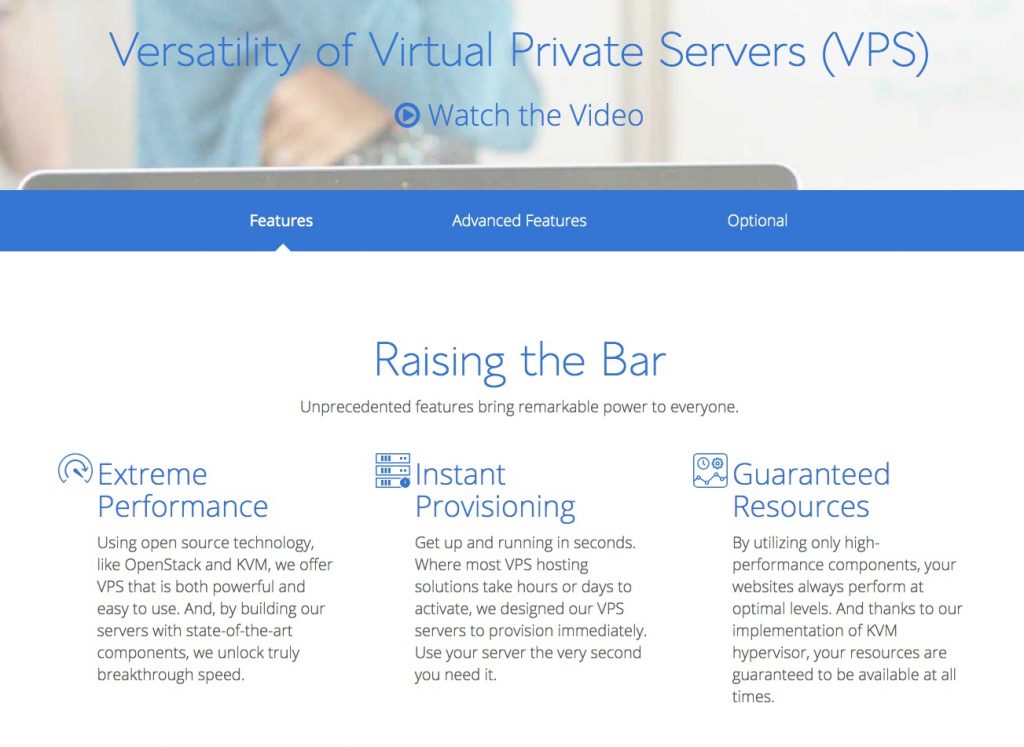
Money-Back Guarantees
To reassure you on matters of reliability and quality, many hosts offer a money-back guarantee.
That is, if you find that you don’t like what you’ve purchased, you can cancel within the guaranteed period and receive a refund.
Be sure to read the terms of the guarantee to find out exactly what’s covered and what the process is for obtaining a refund.
Scalability and Flexibility
If you have an existing website, you’ll need to migrate it from your current host to your new host. This process is, in short, the movement of all data and files related to your website.
Site Migration
There are many ways to migrate your website, including manually using FTP tools.
Some hosts, like SiteGround, offer migration tools and services as bonuses included with your purchase of a web hosting package. Others, like Bluehost, charge a fee for migration.
Scaling Up to Accommodate Increasing Traffic
Sometimes, you’ll find your site traffic growing to the point where you need more resources.
When your website, hosted using a shared plan, is a bit too slow for the traffic levels you see, you might consider springing for a VPS plan.
Typically your host will inform you when you are close to needing a higher-level plan.
This upgrade might require a migration as well, even if you aren’t changing hosts.
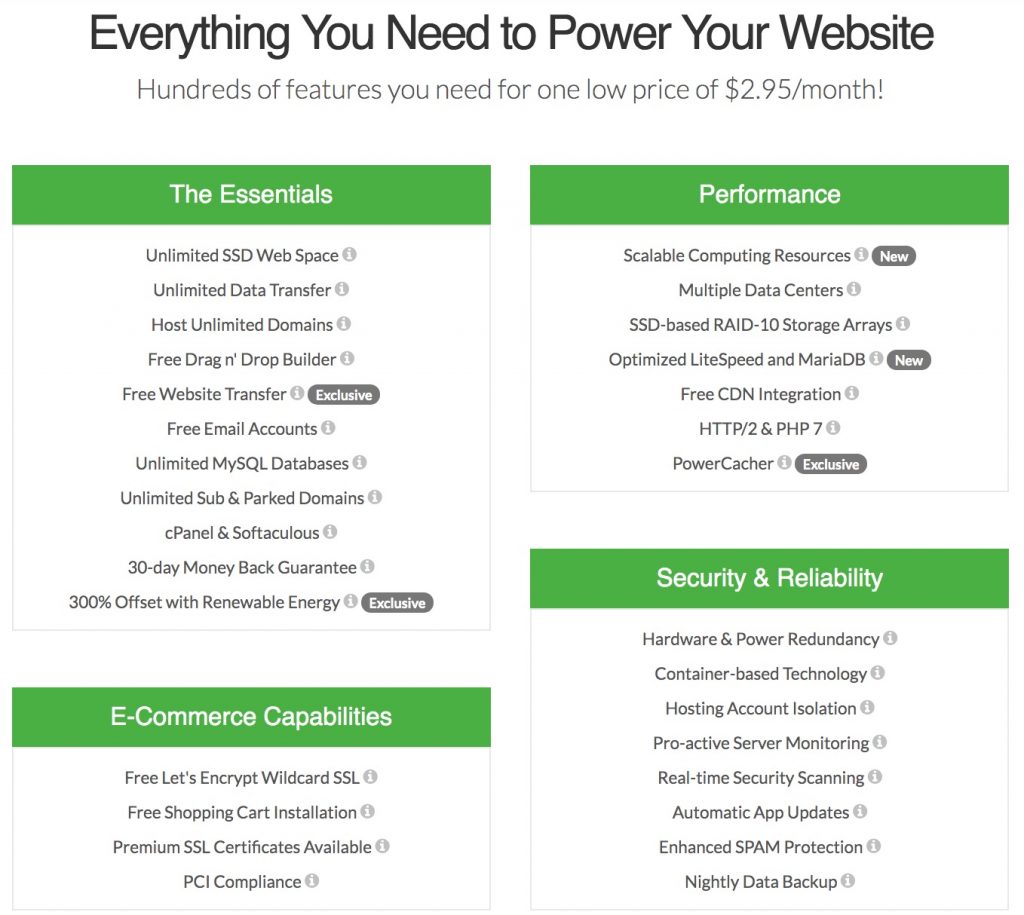
Data Security and Backups
To make sure that you lose as little as possible in the event your site goes down, you should back up your website frequently, even daily.
Automated or Manual Backups?
Some web hosts will offer tools to help you create backups, while others will offer automated backup services.
If you’re not technically inclined you should choose a host that provides automated backups.
SSL Certificates: Every Site Needs One
You’ll also want to make sure that transmissions to and from your web server are secure, and one of the key aspects of doing so is using SSL certificates.
SSL certificates are a must-have as Google now considers them a best practice. Indeed, many browsers will mark your site as “insecure” if you do not have an SSL certificate.

These certificates are sometimes included free of charge – like with A2 Hosting.
PCI Compliance
Squarespace is PCI compliant.
If you have an online store, you’ll want to go a step further and make sure that your solution is PCI compliant.
Some hosts, like A2 Hosting, are not PCI compliant but you can use shopping carts, like PayPal and Stripe, that are.
If you’re using a hosted e-commerce builder make sure it’s PCI compliant. Squarespace is an example of a hosted site builder that’s PCI compliant.
Summary – What Makes Some Web Hosts the Best?
The best web hosts are those that balance things like performance and security with the price.
Because there are always trade-offs, the best host for you depends on your goals. If you’re just getting started, you might prioritize cost and ease-of-use over everything else.
If you’re launching an e-commerce store, you might favor security and speed, even if that costs you a bit more.
How do you spot an undesirable web host? Since no company is going to advertise their limitations, we recommend looking at reviews written by actual customers to see how they rate their hosts.
There’s no substitute for actual user experience!
